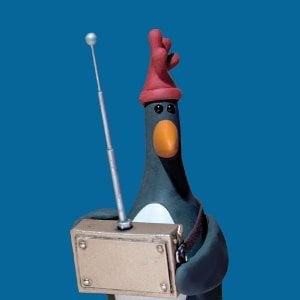There are quite a few choices of brands when it comes to purchasing harddisks or ssd, but which one do you find the most reliable one? Personally had great experiences with SeaGate, but heard ChrisTitus had the opposite experience with them.
So curious to what manufacturers people here swear to and why? Which ones do you have the worst experience with?
If you want real data instead of feels, look at the BackBlaze report they publish every year. Even within a particular manufacturer varying models can have widely different failure stats.
https://www.backblaze.com/blog/backblaze-drive-stats-for-2023/
HGST does trend towards being a winner, and now with the largest Western Digital drives. But you definitely should pay attention to specific models like you said.
buying tech products by brand allows brands to sell you a shitty product at premium price points. companies will always shit out bad eggs at times, and its your job to know which product line are bad and not let brand loyalty bypass that.
at the bare minimum, if you are buying by brand, buy it solely based on customer support, as some companies are significantly better at that than others, which is an objective trait.
I learned a long time ago that the manufacturer doesn’t matter much on the long run. They all have a bad model occasionally. I have 500GB Seagate drives that still work, and some 1TB drives that died within a year. I’ve had good luck with recent WD Red 4TB drives, but my 2TB Green drives have all died on me. I had a some of the Hitachi Deskstar drives that worked perfectly for years when no one would touch them because of a bad production run. I currently have a Toshiba 8TB that I had never heard of before, but seems to be rock solid for the last year.
Pick a size that you want, look at what’s available, and research the reasonably priced ones to see if anyone is complaining about them. Review sites can be useful, but raw complaints in user forums will give you a better idea of which ones to avoid.
Can confirm the statistics: I recently consolidated about a dozen old hard disks of various ages and quite a few of them had a couple of back blocks and 2 actually failed. One disk was especially noteworthy in that it was still fast, error-less and without complaints. That one was a Seagate ST3000DM001. A model so notoriously bad that it’s got its own Wikipedia entry: https://en.wikipedia.org/wiki/ST3000DM001
Other “better” HDDs were entirely unresponsive.Statistics only really matter if you have many, many samples. Most people (even enthusiasts with a homelab) won’t be buying hundreds of HDDs in their life.
With spinning disks, I preferred Seagate over Western Digital. And then move to HGST.
Back in those days, Western Digital had the best warranty. And I used it on every Western Digital. But that was still several days without a drive, and I still needed a backup drive.
So it was better to buy two drives at 1.3 x the price of one Western Digital. And then I realized that none of the Seagate or HGST drives failed on me.
For SATA SSDs, I just get a 1TB to maximize the cache and wear leveling, and pick a brand where the name can be pronounced.
For NVME, for a work performance drive, I pick a 2TB drive with the best write cache and sustainable write speed at second tier pricing.
For a general NVME drive, I pick at least a 1 TB from anyone who has been around long enough to have reviews written about them.
Yup, knock on wood, I’ve had lots of Seagate drives over the decades and I’ve never had any of them go bad. I’ve had two WD drives and they both failed
Assume your hard drives will fail. Any time I get a new NAS drive, I do a burn-in test (using a simple
badblocksrun, can take a few days depending on the size of the drive, but you can run multiple drives in parallel) to get them past the first ledge of the bathtub curve, and then I put them in a RaidZ2 pool and assume it will fail one day.Therefore, it’s not about buying the best drives so they never fail, because they will fail. It’s about buying the most cost effective drive for your purpose (price vs avg lifespan vs size). For this part, definitely refer to the Backblaze report someone else linked.
When buying disks do some research for the exact model to ensure they are not SMR drives if you plan on using them in RAID. Some manufacturers will not tell you if they are SMR drives and this can do anything from tank write performance to make the RAID reject the drive entirely.
2 of my 6 disks are failing thanks to WD’s EFAX line
Bastards
For hard drives Toshiba, though SeaGate would be my second pick. Fuck WD.
On SSDs I go on Wikipedia and look at a list of flash + controller manufacturers and pick one of those. (Samsung, Kioxia (I think), Sandisk)
With the very limited number of drives one may use at home, just get the cheapest ones (*), use RAID and assume some drive may fail.
(*) whose performances meet your needs and from reputable enough sources
You can look at the backblaze stats if you like stats, but if you have ten drives 3% failure rate is exactly the same as 1% or .5% (they all just mean “use RAID and assume some drive may fail”).
Also, IDK how good a reliabiliy predictor the manufacturer would be (as in every sector, reliabiliy varies from model to model), plus you would basically go by price even if you need a quantity of drives so great that stats make sense on them (wouldn’t backblaze use 100% one manufacturer otherwise?)
I swear allegiance to the only one true storage vendor, Micropolis. The Micropolis 1323A being the embodiment of perfection in storage basked in the glow of the only holy storage interconnect, MFM.
I wait patiently for the return of Micropolis so that I may serve as their humble servant.
Acronyms, initialisms, abbreviations, contractions, and other phrases which expand to something larger, that I’ve seen in this thread:
Fewer Letters More Letters NAS Network-Attached Storage RAID Redundant Array of Independent Disks for mass storage SATA Serial AT Attachment interface for mass storage SSD Solid State Drive mass storage ZFS Solaris/Linux filesystem focusing on data integrity
5 acronyms in this thread; the most compressed thread commented on today has 6 acronyms.
[Thread #555 for this sub, first seen 29th Feb 2024, 00:35] [FAQ] [Full list] [Contact] [Source code]
HGST personally, because my failure count over time for those drives has been in the single digits through ~60 drives in around 15 years, though every manufacturer is going to have missteps or failures. I can say I’ve had bad experiences with Toshiba, but I’m sure you can find someone who swears by them also. Ultimately my anecdotal evidence in either direction is an unreliable crystal ball you should take with a grain of salt.
The suggestion to check Backblaze reports is great, but I’d also recommend to vary your manufacturers if you’re able and instead build your storage solution with the assumption that drives are “wear units” and will fail. If you have some redundancy built in where you’re able to tolerate the failure of one (or ideally multiple) drive failures without losing data, then even though the question still matters, it matters a bit less.
Hard disks, WD/HGST.
I’ve had good luck with EMC and NetApp for enterprise solutions, Synology for SMB class NAS storage, and rely on TrueNAS/ZFS on supermicro hardware at home, which has been rock solid for years and years.
SSD? Crucial.
They officially supported a non-standard setup I had, and they were totally there for me in a jam. Spinning rust I’ll go other names, but SSD is crucial-first. I don’t even care the cost.
deleted by creator
Definetly Western Digital for used drives, some time ago I sold like 3 of these IDE old drives from like 15 or 20 years ago and they was working perfectly. IDK of nowadays WD drives but used to be very good at least for me.







